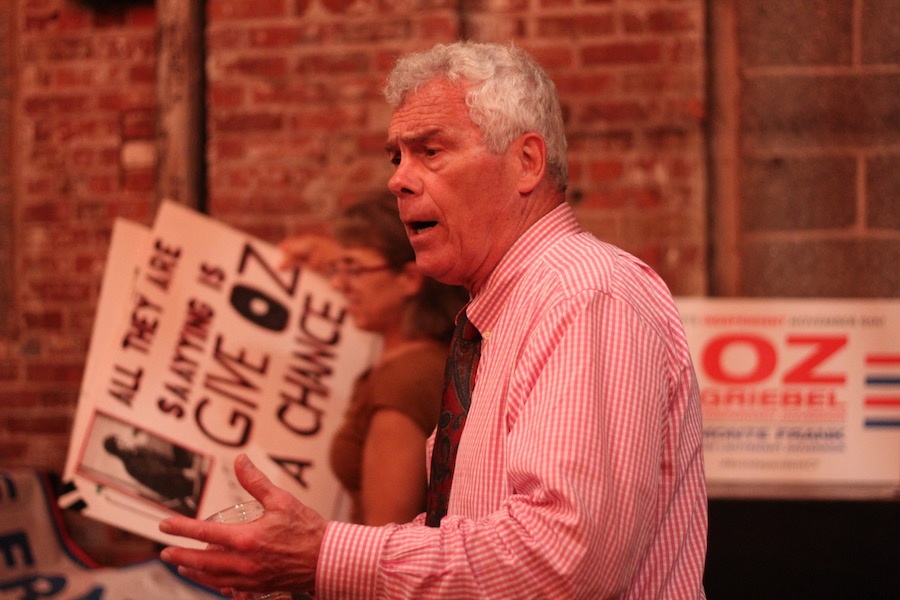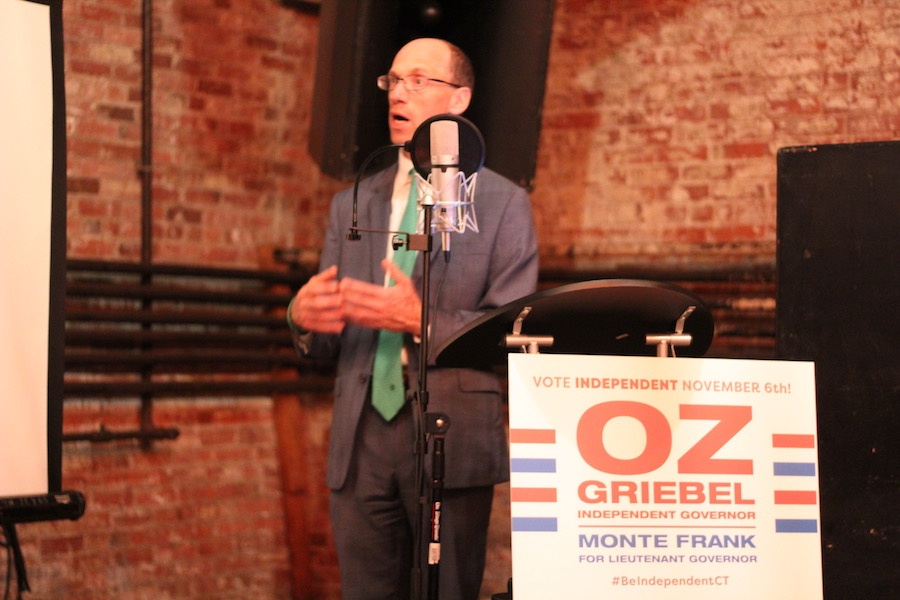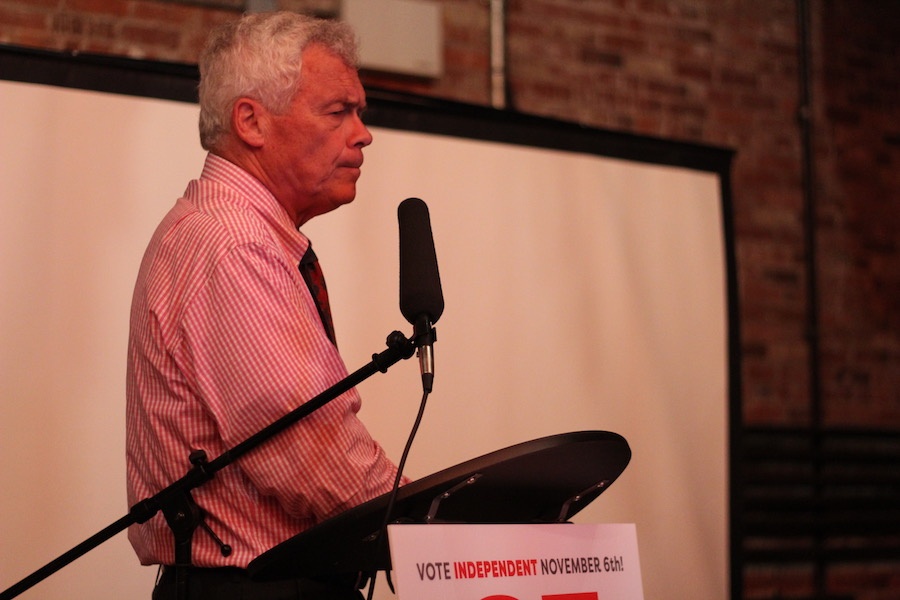
Politics | New Haven | Theater

| Lucy Gellman Photos. |
The following is an entry in our political theater series. To read a straight news piece on last night’s debate and Griebel/Frank offshoot, check out the New Haven Independent’s coverage of the events here and here. To read a piece on where some of the candidates say they stand more broadly, click here.
Connecticut voters don’t have to choose between the lesser of two evils on November 6th. They have a third option, and he talks like Attila The Hun went on a date with Ruth Bader Ginsburg.
Or something like that.
Monday night, those zingers were at the heart of OZ: But Not The Wizard, an introspective two-man cabaret and political engagement at BAR New Haven, back by popular demand after an appearance earlier this summer. Starring unaffiliated gubernatorial candidate Oz Griebel and lieutenant governor hopeful Monte Frank as themselves, OZ painted a portrait of a candidate who wants desperately to stand apart from the rest—and very much does, until he doesn’t. Twelve attended the show, in a pizza-scented back room that has capacity for hundreds.
Like Aneesh Chaganty’s film Searching, this is a play that incorporates several screens. They enable OZ to be a conversation piece: a chance to answer questions posed to the political establishment. The play moved to BAR this week after it was snubbed at the city’s Shubert Theatre, which mounted Two Guys Fight About Taxes at the same time Monday evening. Griebel had originally asked to be part of that ensemble, in which Ned Lamont and Bob Stefanowski play cardboard cutouts of themselves, and do a cha-cha-slide on tax hikes and party politics. OZ came partly as that request was denied.
The show has two encores: debates later this month, and a Nov. 6 election ensemble piece performed in ballot boxes across the state. Audiences have been informed to wear black, because it may feel like a funeral. Critics are still mourning the premature end of Hell Yes! Eva’s My Girl, the intimate and unexpected breakout hit that ended prematurely in August.
"While we may have been excluded from the debate, we are not excluded from democracy,” Frank announced in a passionate monologue at the beginning, as Griebel cued up questions on a screen before him. “We’re gonna answer the questions, we’re gonna promote real ideas, not engage in name-calling, and push the issues that are so important for Connecticut voters forward.”

But what are those issues? Beneath blue and red lights at center stage, Griebel and Frank insist they are your guys (a genial song and dance number titled “Pretty Please, Make It Unaffiliated This Year”), pulling out credentials that include membership in the Connecticut Business & Industry Association (CBIA), the Connecticut Bar Associations and board positions at the Bushnell Theater. They know their stuff, they say, but they can also joke about pizza and New Haven. They can trade anecdotes about the campaign stops they’ve made.
Then they get serious. Only minutes into the play, Griebel lays the groundwork for his argument: only an independent governor can reach politicians on both sides of the aisle and in “the radical middle,” where partisan politics have left the state legislature divided after several years. And only an Independent can do it while bringing in the private sector.
"Monte and I have lived and worked in the state of Connecticut for 25 years,” Griebel said, light falling on his face just so as he delivered his lines. “We’ve worked for the state of Connecticut.”
“We’re all in this together,” he added, trotting out a campaign slogan perhaps best known for its use in High School Musical.
And for a while, the audience sticks with this duo. Through a plan to involve the private sector to improve elementary, high school and higher education, add after-school programming. Through an eye on better health care, including paid family and medical leave. Through a focus on transit-oriented development (the number “Maybe If We Build It, Millennials Won’t Leave” is particularly compelling), affordable housing, and sustaining community colleges instead of gutting their funding. Through a discussion of legalized pot and a comprehensive approach to opioids.
And particularly through a commitment to upholding social liberties, including same-sex marriage and the right to safe and legal abortion. On those lines Monday, the audience went wild, 24 clapping hands filling the room with sound.
"We are highly supportive of those,” he said of tenants of Roe v. Wade, the three or so women in the room clapping before he’d even finished his statement. “You’ve got other issues sitting around here that could be threatened … the right to same-sex marriage is something we would continue to support in Connecticut. Letting people choose what they want, how they want to live their lives is a critical component of who we are as people.”

But a question still hangs over the stage at the end of OZ, one that threatens to rear its head several times over before November. Can he do this? Does he have what it takes to achieve both bipartisan legislation, and deals with the private sector that don’t shortchange programs that have already received government cuts? And is he really that different from the other candidates?
There are slips in the script that suggest not. He seems flexible, affable even, until he delivers lines like “If we don’t like the question, we’ll just answer something else.” There’s a punchy, rambo quality there, but also one that makes you wonder how receptive he’ll be to legislators—and constituents—at all points on the political spectrum.
In another scene, he is fired up about fighting food insecure neighborhoods, and instituting better diet as preventative medicine. It smooth and promising, something between Josh Wilder’s recent play Salt Pepper Ketchup and the gamification of diabetes treatment. But he gets a line twisted, conflating limited access to fresh food with adults’ lack of understanding of proper nutrition. He doesn’t suggest a plan to build farmers’ markets or grocery stores, support federal assistance programs, and get affordable produce into neighborhoods that have almost none. In other words, he holds the line.
In another, Griebel paints a picture of a healthier, more livable Connecticut that has added 200,000 jobs, increased cultural offerings, implemented better transportation, and grown its educational institutions. A Connecticut where businesses want to stay (a charming tap number called “Make This Your Hoooome.”). But it’s not clear what kind of jobs those are—or if they’ll sustain people.
And he invokes a great tightrope walking act, preaching fiscal conservatism (“I consider myself in the Attila the Hun camp”) alongside ostensibly liberal values (“Letting people live their lives is critical”).
The problem is, we in the audience don’t know if it will work. But we have a creeping feeling, deep in the pit of our stomachs, that we know how it will end.

